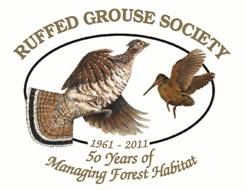Ruffed Grouse Society to Celebrate its 50th Anniversary
OutdoorHub 10.19.11
 Coraopolis, PA – What began as a vision for Bruce R. Richardson, Jr.; Seybert Beverage; and Dixie L. Shumate, Jr., in Monterey, VA in 1961, the Ruffed Grouse Society (RGS), which will celebrate its 50th Anniversary on October 24, 2011, has since become one of the nation’s most respected conservation organizations.
Coraopolis, PA – What began as a vision for Bruce R. Richardson, Jr.; Seybert Beverage; and Dixie L. Shumate, Jr., in Monterey, VA in 1961, the Ruffed Grouse Society (RGS), which will celebrate its 50th Anniversary on October 24, 2011, has since become one of the nation’s most respected conservation organizations.
Through its commitment to sustain populations of ruffed grouse, American woodcock and other game and non game species, RGS has been recognized by national and state wildlife agencies for its achievements in forest management, earning a reputation as an organization dedicated to achieving its goals through research, education and the development and restoration of habitat.
“For five decades the Ruffed Grouse Society has remained unique among sportsmen’s and conservation organizations, inasmuch as it has withstood the test of time, becoming more distinguished by our heritage, traditions, and doctrine,” said RGS President and CEO Mike Zagata. “Reaching this memorable milestone can be accredited to our dedicated staff, wildlife biologists, regional directors, our many chapters and the thousands of chapter volunteers who over these past fifty years have helped this organization grow; as well as to a commendable Board of Directors, who are equally committed to the RGS mission as the founders were in 1961.”
“Indeed fifty years is a long time, but we have been working that long to get folks to understand that it’s OK — no a necessity — to cut trees in order to provide habitat for wildlife, both hunted and non-hunted, that need young forest (the ones that spring up following a timber harvest) to survive. We’re not there yet, but our track record is improving. Hopefully it won’t take another 50 years to achieve our goals,” Zagata continued.
Headquartered in Coraopolis, Pennsylvania, RGS membership has grown to more than 15,000 and 130 chapters, made up mainly of grouse and woodcock hunters who support national scientific conservation and management efforts to ensure the future of the species. In keeping with those efforts, RGS employs a team of wildlife biologists to work with private landowners, and governments, including local, state and federal land managers who are interested in improving their land for grouse and woodcock and other songbirds and wildlife that have similar requirements; all done with individualized attention to specific programs.
RGS also has a team of regional directors who help organize chapters consisting of members who share a common interest and passion for these birds and other wildlife, while enjoying the lore, dog work, excitement and camaraderie of other enthusiasts.
To achieve its goals over the past half century RGS has based its work on scientific research into the needs of ruffed grouse and woodcock. In addition, RGS-supported research exploring the dynamics of forest growth has been the key to developing effective methods of forest wildlife habitat improvement.
Also, during the past 50 years RGS has been in the forefront of habitat preservation and restoration of more than a half million acres around the country, raising and expending millions of dollars along the way. In short, no other organization in the long and cherished history of the conservation movement has dedicated more time and/or money to the improvement and restoration of young forest or early successional wildlife habitat. This year alone, RGS has spent about $700,000 generated by its statewide “Drummer Funds” from chapter events and grants.
With an annual budget of roughly $3 million — of which $1 million comes from fund-raising events organized by local chapters in the U.S. and Canada — RGS has been able to devise ways to efficiently make a positive impact for wildlife. Among the dividends of the continued fund-raising success are two conservation programs that in the first few years of existence have influenced many thousands of acres of woodland wildlife habitat.
One of these programs — Coverts — uses special seminars to educate owners and managers of private, non-industrial woodlands in conservation-related issues. The companion “Management Area Projects” has allowed RGS to help directly implement forest wildlife habitat development on public lands.
In brief, the Ruffed Grouse Society is an organization that traditionally works in three interrelated areas: research, education and habitat development, all within keeping of the sport hunting tradition and outdoor heritage.
More information on the history of RGS, its mission, management projects and membership can be found on the web at: www.ruffedgrousesociety.org.

